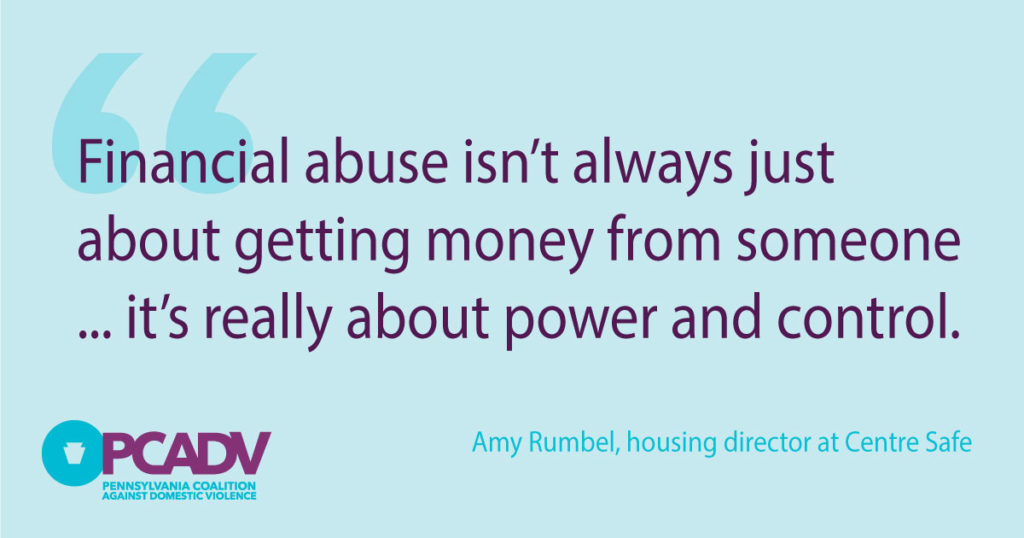Domestic violence is more than just physical violence. That’s a part of it, yes, but there are many forms of abuse that are examples of domestic violence.

One of the most prominent forms of abuse is financial abuse, which is present in nearly 98 percent of abusive relationships.
Financial abuse is when one intimate partner has control over the other partner’s access to economic resources, which diminishes the victim’s capacity to support themselves and forces them to depend on the perpetrator financially.
With April being Financial Literacy Month, it’s important to shine a light on financial abuse, and how PCADV addresses it.
“I think it’s really important. Most people, when that flash picture that comes to their mind when we say domestic violence is a husband punching a wife, right? Like you know, that’s domestic violence. And we know that that’s just one piece of it, so there’s so much more underneath it, if you will,” said Amy Rumbel, housing director at Centre Safe.
As a way to help survivors who face financial hurdles, PCADV established the Economic Justice Initiative in 2012 through funding from the Allstate Foundation.
Since then, the program has evolved into a multi-faceted, statewide-coordinated effort between PCADV and its 59 community-based domestic violence programs, with 29 programs and more than 20,000 victims served.
The goal for the initiative is to improve the social conditions that prevent long-term independence and safety through comprehensive domestic violence program advocate training, and the continual development of tools and resources that address the barriers to economic stability and safety.
“[It’s] things like when an abusive partner tries to control the checking account, the savings account, or the credit cards. So really trying to control every aspect of financial independence that a person might have,” Rumbel said. “Also when it comes to jobs and earning an income, we often see abusers trying to wreck that and sabotage the job – even if it’s a well-paying job.”
During the pandemic, PCADV and its member programs adapted to the socially distanced climate for working with survivors, when economic justice was more important than ever.
Rumbel said that everyone has been affected by COVID-19 in one way or another, and one of the ways that financial abuse can take place during this time is around the withholding of stimulus checks.
“One of the big things right now during COVID is the stimulus checks. We’ve heard over and over again how people don’t have access to their stimulus checks because the abusive partner still has access to the accounts and to that money,” she said. “So, we have some survivors who have not seen one of the stimulus checks over the last year, so things like that. It’s really about power and control. It’s such a manipulative and controlling way to isolate a person to stop them from having power over their own life.”
And the power over their own life is something important to stress, as Rumbel explains that having power over someone else is often the driving force behind financial abuse – not the money.
“Financial abuse isn’t always just about getting money from someone, but it’s really about power and control,” said Rumbel. “You really have control over their life, so financial abuse, we see that in almost every situation with every client that we work with in some form.”
The Economic Justice Initiative focuses on providing specific individually tailored information to victims across three critical points of victimization:
- Crisis
- Post-Crisis Short Term
- Long-Term Safety and Independence
The efforts supported through the initiative include:
- Teaching financial basics and enhancing credit
- Increasing job readiness and training
- Promoting long-term stability
- Expanding partnerships
And while programs are still working with these objectives in mind, they’ve had to adjust their efforts, while still delivering the assistance that survivors.
The programs have thought outside-the-box with their approaches since March 2020, by:
- Setting up space in programs for virtual job interviews
- Using online chat to check in with survivors, and sending links to materials
- Building relationships with banks and financial advisors for remote sessions to help individuals rebuild their credit
- Meeting on park benches so folkx could meet up in a safe space while maintaining social distancing
From housing, to self-sufficiency, to peace of mind – understanding the role that financial security plays in helping survivors is critical.
“Economic justice and financial literacy is so important so that they can be in charge of their own life, and It will empower them to feel like they can make those decisions, do those things, and they don’t need to rely on this person to do all of it,” Rumbel said. “If we’re really looking at self-sufficiency, we’re really helping people to heal from being overpowered and controlled. Then we have to empower them by giving them the tools and the education and the confidence.”